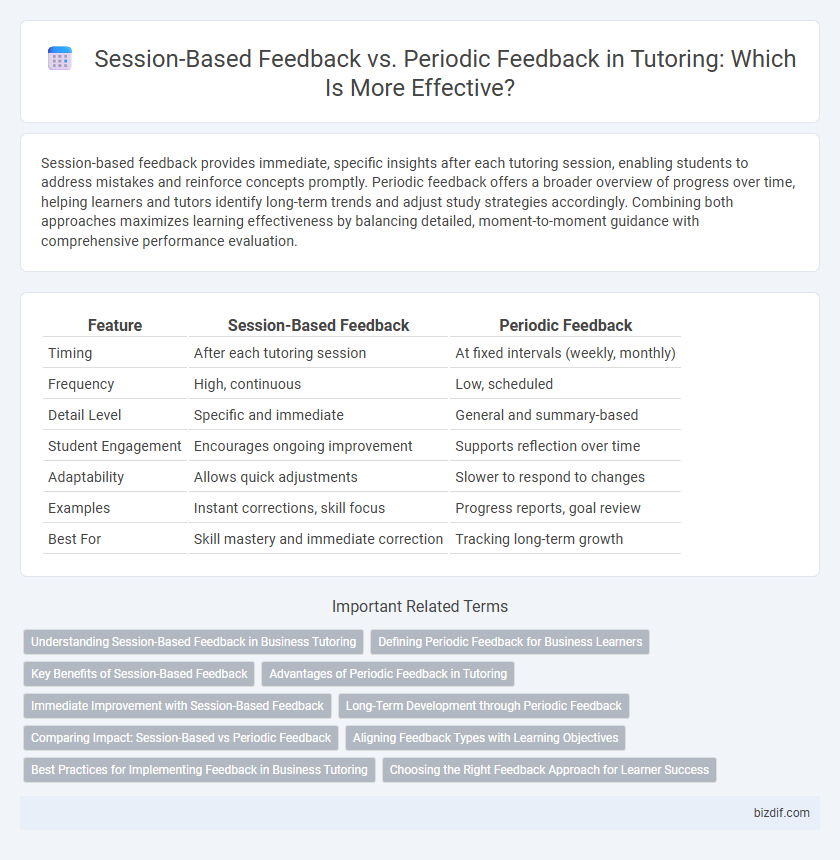Session-based feedback provides immediate, specific insights after each tutoring session, enabling students to address mistakes and reinforce concepts promptly. Periodic feedback offers a broader overview of progress over time, helping learners and tutors identify long-term trends and adjust study strategies accordingly. Combining both approaches maximizes learning effectiveness by balancing detailed, moment-to-moment guidance with comprehensive performance evaluation.
Table of Comparison
| Feature | Session-Based Feedback | Periodic Feedback |
|---|---|---|
| Timing | After each tutoring session | At fixed intervals (weekly, monthly) |
| Frequency | High, continuous | Low, scheduled |
| Detail Level | Specific and immediate | General and summary-based |
| Student Engagement | Encourages ongoing improvement | Supports reflection over time |
| Adaptability | Allows quick adjustments | Slower to respond to changes |
| Examples | Instant corrections, skill focus | Progress reports, goal review |
| Best For | Skill mastery and immediate correction | Tracking long-term growth |
Understanding Session-Based Feedback in Business Tutoring
Session-based feedback in business tutoring delivers immediate, specific insights right after each tutoring session, enabling students to promptly identify strengths and areas for improvement. This targeted approach enhances learning efficiency by addressing misunderstandings while the content is fresh, compared to periodic feedback that provides generalized evaluations after extended intervals. Implementing session-based feedback fosters continuous skill development and keeps business students actively engaged in applying concepts in real-time.
Defining Periodic Feedback for Business Learners
Periodic feedback for business learners involves providing structured evaluations and insights at regular intervals throughout the learning process, typically weekly or monthly. This approach allows learners to reflect on their progress, identify areas for improvement, and adjust strategies over time to meet specific business goals. Consistent checkpoints in periodic feedback enhance sustained motivation and reinforce skill development in a professional context.
Key Benefits of Session-Based Feedback
Session-based feedback in tutoring offers immediate, personalized insights that enhance student understanding and retention by addressing misconceptions as they arise. This approach fosters adaptive learning, allowing tutors to tailor instruction dynamically to each student's evolving needs. The key benefits include increased engagement, timely correction of errors, and improved academic outcomes compared to periodic feedback methods.
Advantages of Periodic Feedback in Tutoring
Periodic feedback in tutoring allows for comprehensive assessment of a student's progress over extended intervals, helping identify long-term learning patterns and knowledge retention. It facilitates strategic adjustments in teaching methods by evaluating overall academic performance rather than isolated moments. This approach promotes sustained motivation and deep understanding, as students receive reflective insights aligned with curriculum milestones.
Immediate Improvement with Session-Based Feedback
Session-based feedback in tutoring delivers immediate, actionable insights during each session, enabling students to quickly correct mistakes and enhance understanding in real time. This approach significantly boosts learning efficiency by reinforcing correct concepts promptly, leading to faster skill acquisition compared to periodic feedback. Tutors leveraging session-based feedback create dynamic interactions that adapt to student needs instantly, fostering continuous improvement and sustained academic growth.
Long-Term Development through Periodic Feedback
Periodic feedback in tutoring supports long-term development by allowing students to reflect on progress over extended periods, facilitating deeper understanding and sustained improvement. Unlike session-based feedback, which targets immediate performance, periodic assessments identify overarching patterns and learning gaps, guiding strategic adjustments to study habits. Data-driven insights from periodic feedback enhance personalized learning plans, promoting retention and mastery beyond individual sessions.
Comparing Impact: Session-Based vs Periodic Feedback
Session-based feedback offers immediate, specific insights that help students correct errors and reinforce learning in real-time, enhancing retention and engagement during tutoring. Periodic feedback provides a broader overview of progress, allowing for strategic adjustments in learning goals but may delay necessary corrections. Research indicates session-based feedback tends to boost short-term performance and motivation, while periodic feedback supports long-term skill development and reflection.
Aligning Feedback Types with Learning Objectives
Session-based feedback provides immediate, specific insights that reinforce mastery of targeted skills during tutoring sessions, enhancing real-time learning adjustments. Periodic feedback offers a broader evaluation of overall progress relative to long-term learning objectives, supporting strategic planning and goal refinement. Aligning feedback types with learning objectives ensures that session-based feedback accelerates skill acquisition while periodic feedback guides sustained academic growth.
Best Practices for Implementing Feedback in Business Tutoring
Session-based feedback in business tutoring provides immediate, targeted insights that help students adjust strategies and improve performance promptly. Periodic feedback offers a comprehensive overview of progress, facilitating long-term goal tracking and strategic planning. Combining real-time session feedback with scheduled assessments enhances learner engagement and maximizes skill development in business contexts.
Choosing the Right Feedback Approach for Learner Success
Session-based feedback offers immediate, specific insights that help learners correct mistakes and reinforce understanding during each tutoring session. Periodic feedback provides a broader evaluation of progress, enabling adjustments to learning strategies over time. Selecting the optimal feedback approach involves considering learner goals, motivation levels, and subject complexity to maximize engagement and achievement.
Session-based feedback vs periodic feedback Infographic

 bizdif.com
bizdif.com